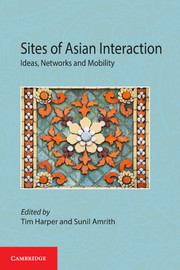Book contents
- Frontmatter
- Contents
- List of figures
- Preface
- Introduction
- 1 Singapore, 1915, and the Birth of the Asian Underground
- 2 Living in the Material World: Cosmopolitanism and Trade in Early Twentieth Century Ladakh
- 3 Nation, Race, and Language: Discussing Transnational Identities in Colonial Singapore, circa 1930
- 4 Intimate Interactions: Eurasian Family Histories in Colonial Penang
- 5 Citing as a Site: Translation and Circulation in Muslim South and Southeast Asia
- 6 Popular Sites of Prayer, Transoceanic Migration, and Cultural Diversity: Exploring the significance of keramat in Southeast Asia
- 7 Connecting People: A Central Asian Sufi network in turn-of-the-century Istanbul
- 8 ‘Enough of the Great Napoleons!’ Raja Mahendra Pratap's Pan-Asian Projects (1929–1939)
- 9 Chinatowns and Borderlands: Inter-Asian Encounters in the Diaspora
- 10 Creating Spaces for Asian Interaction through the Anti-Globalisation Campaigns in the Region
- Contributors
- Index
8 - ‘Enough of the Great Napoleons!’ Raja Mahendra Pratap's Pan-Asian Projects (1929–1939)
Published online by Cambridge University Press: 05 July 2014
- Frontmatter
- Contents
- List of figures
- Preface
- Introduction
- 1 Singapore, 1915, and the Birth of the Asian Underground
- 2 Living in the Material World: Cosmopolitanism and Trade in Early Twentieth Century Ladakh
- 3 Nation, Race, and Language: Discussing Transnational Identities in Colonial Singapore, circa 1930
- 4 Intimate Interactions: Eurasian Family Histories in Colonial Penang
- 5 Citing as a Site: Translation and Circulation in Muslim South and Southeast Asia
- 6 Popular Sites of Prayer, Transoceanic Migration, and Cultural Diversity: Exploring the significance of keramat in Southeast Asia
- 7 Connecting People: A Central Asian Sufi network in turn-of-the-century Istanbul
- 8 ‘Enough of the Great Napoleons!’ Raja Mahendra Pratap's Pan-Asian Projects (1929–1939)
- 9 Chinatowns and Borderlands: Inter-Asian Encounters in the Diaspora
- 10 Creating Spaces for Asian Interaction through the Anti-Globalisation Campaigns in the Region
- Contributors
- Index
Summary
India, will you not listen to me? […] I beg you to adopt our program. It is the natural growth of your own ancient culture. It is the fulfillment of Mahatma Gandhi's great scheme of life. I say, realise yourself as Aryan, Aryan which was once the source of all common culture on this earth. From Iran to Assam, including Afghanistan and Nepal let us have a sense of common unity. Then, fraternise with the rest of Asia.
Introduction
Interwar internationalism
Sometimes, sites of Asianist engagement can be connected through the life and travels of a single man. Raja Mahendra Pratap (1886–1979) was convinced that the struggle for India's freedom could not be fought from within the country. This resulted in three turbulent decades of travel, with a view to seeking outside help to overthrow British rule in India. The majority of his life in exile was spent in various parts of Asia, over the course of which he interacted with people and groups who occupied themselves with the future of the Asian continent in various ways, ranging from Lenin to the Dalai Lama and from the University of the Toilers of the East in Tashkent to the Pan-Asiatic Society in Japan. While his plans seemed unrealistic at times, even to contemporaries, this chapter maintains that his choice to work towards a unified Asia—which would, in his view, inevitably lead to an independent India—was not at all uncommon.
- Type
- Chapter
- Information
- Sites of Asian InteractionIdeas, Networks and Mobility, pp. 171 - 190Publisher: Cambridge University PressPrint publication year: 2014



